In 2019, British and Irish folk music is more exciting and urgent than it’s been for years. Much of it sounds powerfully raw and immediate, with many groups recognising the politics of our times in their songs, and incorporating contemporary stories within more ancient musical motifs. Here are bands confronting the legacies of abortion rights; the oppression of women, homosexuals and other minority communities; the loss of minority language; the refugee crisis; and stories of people who have stood up to hate. They’re not doing so in browbeating, bluntly obvious ways either. Some are uncovering small but powerful stories of overlooked people, whose achievements we can learn from. Others are creating more oblique and moving work, highlighting the injustices that linger in our society.
Many younger makers of modern folk grew up during the turn-of-the-century indie-folk revival, where taboos surrounding less popular singing styles and traditional songs started to disappear. A steady flow of reissues by the likes of Bert Jansch, Shirley Collins and Lal and Mike Waterson has since revealed how much of our country’s folk culture had been neglected.
We could call this explosion “woke” folk – though there’s much more to this disparate collection of acts than a slogan. Some have an experimental edge, incorporating influences from other genres such as krautrock. Some are more accessible and rousing, but all of the British and Irish artists that follow here share a common musical sensibility: they sing in recognisable voices, without varnish and sheen, delivering messages straight and sure about who we were, and who we are now. Jude Rogers
Grace Petrie (main photograph)
Leicester-based singer-songwriter and activist who found her calling as a political folk musician after the 2010 general election
It’s rare that an interview can vindicate the wishes of an artist. Rare, but possible. In 2016, the self-proclaimed “radically feminist and radically leftwing” musician Grace Petrie released the song, I Wish the Guardian Believed That I Exist, in response to an article in the paper lamenting the current lack of protest singers in folk music.
In fact, by that point the Leicester-based singer-songwriter had been making politically charged protest music for six years, since the release of her breakthrough single Farewell to Welfare. In that fierce, guitar-driven number, Petrie found a new calling as a political folk musician, spurred by the 2010 general election and the Tories’ subsequent coming to power, propped up by the Liberal Democrats. “It was when the government changed in 2010 that I started thinking a lot more about austerity and there seemed to be much more to protest about,” says the 31-year-old, when I speak to her over the phone from Leicester. “It hit closer to home how things would change, to impact my life and those of the people I knew. Nine years on and this regime of austerity has left Britain unrecognisable.”
Before the explicit political references began appearing, though, Petrie describes the music she used to make as “abstractly political”. “When I was a teenager I was writing what I saw as pop songs – songs about my love life, because that’s what pop songs are about – but my love life concerned girls, since I wasn’t in love with boys,” she says. “I never saw that as a political act initially, but now I see it as a really political thing; the visibility of queer musicians and centring that in lyrics.”
This visibility still sits on the fringes of the music industry. Having self-funded her first eight albums, she released last year’s Queer As Folk through crowdfunding, still eluding major-label interest. “My career has been completely outside the mainstream and I’ve never known it to be any different,” Petrie says. Even the folk traditionalists were proving hard to win over. “The content of folk songwriting at the moment can be amazingly radical,” she continues, “but I’m not sure the audiences are with them all the time. You have your very wealthy, white, Telegraph-reading folk-club regulars who are happy to hear a song about the peasants’ revolt, but if you talk about food banks in their town, that’s seen as really uncouth. You notice this awkward shuffle go across the room.”
So it must have been an extra slight to read that newspaper story about a lack of politics in folk. “I can’t stand those articles,” Petrie says. “Invariably it’s written by someone whose heyday was in the 80s and they’re writing the same boring and incorrect story about how there is no political music any more. Well, it’s almost impossible not to write political music in the state we’re in now, and this scene is radical and vibrant – you just have to open your ears to it.”
Determined to keep spreading her message – newspaper articles or not – Petrie has just performed a mini-tour with all-female folk “supergroup” Coven to mark International Women’s Day, and is embarking on her own solo dates throughout the UK. “Everyone in society has a collective responsibility to make sure nobody is left behind,” she says, “and I still have enormous hope in the young people of this country to change the trajectory we’re going in. This music may be a way to reach them.” Ammar Kalia
Petrie’s UK and Ireland tour starts on 11 April at The Spirit Store, Dundalk
Lankum
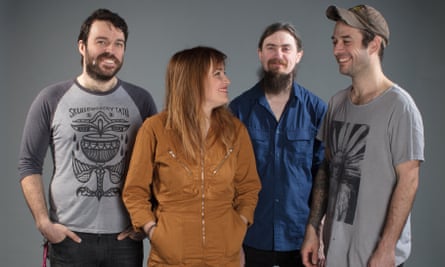
Dublin four-piece who write about illegal abortions, poverty and emigration are known for their full-throttle live shows
It’s a late winter’s afternoon in Derry, the Northern Irish border town holding its breath as it awaits 29 March. In the town’s strikingly modern Cultúrlann Uí Chanáin [the Irish language, arts and cultural enterprise centre, built in 2008 with Arts Council funding], the band playing tonight are putting the world to rights over Tayto crisps in the cafe. With their tattoos and punky, pared-down clothes, they look like the Pixies – but they’re more likely to be the next Pogues.
“Brexit is weirdly hilarious,” says singer-guitarist Daragh Lynch, his tattooed wrists revealing a teenage love of Guns N’ Roses (a huge, ancient tree, much more in line with his band Lankum’s music now, gnarls up his left arm). “The way Britain has treated Ireland in the past, and how now Britain is pulling itself apart.” He shrugs. “Well, it would be funny if it wasn’t actually happening.”
“I heard the DUP don’t believe that dinosaurs existed,” adds fiddle-player Cormac Mac Diarmada, and the rest of the band fall about laughing, shaking their heads. Tonight’s gig is just around the corner from Rossville Street on the Bogside, where Bloody Sunday happened 47 years ago. Here, the impact of Brexit will be felt immediately. Singer Ian Lynch, Daragh’s brother, who took up the uilleann pipes in his mid-20s, and went back to college to study Irish language and folklore, mentions how weak the DUP’s hold is within Northern Ireland: 56% of people here voted to remain in the EU. Radie Peat adds quietly how hypocritical it is that they’re demanding to have parity with the UK in Brexit negotiations while abortion still remains illegal here.
That subject has particular resonance for Lankum, a band who weave politics subtly through their bible-black, poetic songs. An original song of theirs, The Granite Gaze, references the women who had to “sneak away across the foam” to Britain for terminations before the referendum in the Irish Republic last year; they played it at a protest when the pope visited Dublin in August 2018. They also did so outside the city’s last Magdalene Laundry, one of Ireland’s notorious houses of confinement for “fallen women”. “It only closed in 1996,” Peat points out, her eyes looking cold at the thought. “It felt very special singing it there. And after the referendum…” She smiles. “I love singing that line now.”
Of all modern folk bands, Lankum are the most full-throttle, jaw-dropping bunch. Signed to indie titans Rough Trade in 2017, where they are the favourite band of label-mates Sleaford Mods, they mix stunning versions of traditional songs with modern originals about poverty and injustice – as well as more raucous jigs about drunkenness and strange old men. Their sound is uncompromisingly experimental at times. Radie Peat’s stark vocals are full of darkness and grit, while the band loop and amplify droning notes from Ian’s pipes, plus Radie’s harmonium and accordion. They love Krautrock: Neu! are favourites to play in their tour van. Their unofficial “fifth member”, studio and live sound mixer, John “Spud” Murphy, is also obsessed with early 90s noisemakers My Bloody Valentine. Experience the band’s long, dark, powerful sets, and it shows.
Lankum began as a punky folk project between the brothers in 2008 – back then, they were known as Lynched. Radie and her schoolfriend Cormac, who was brought up playing and singing folk, joined later. Their 2014 debut album, Cold Old Fire, was funded by an Irish Arts Council grant, its title track showing how Lankum married a contemporary social sensibility with an understanding of their country’s past. It’s a sad, beautiful original by Daragh about Dublin’s unemployment crisis after 2008, written while he was unemployed himself. “We look for signs that Dublin’s heart’s still beating,” he sings, “That concrete and glass… they haven’t stopped the people from screaming”.
Recognition came quickly with a 2015 performance on Later... With Jools Holland, and then came the prospect of an American tour. Before it, however, they changed their name – eyebrows had been raised among their fans in that country, and they listened. “We will not continue to work under our current name while the systemic persecution and murder of black people in the USA continues,” said a statement from the band in 2016.“We’d been feeling uncomfortable,” Ian explains. “It was just a play on words initially. But if we wanted to take our music in the way that we wanted to take it, we had to think about everything.” Not that they avoided dark shadows completely: they named themselves Lankum after a murderous protagonist in an Irish traveller’s version of one of the Roud ballads.
Their first album for Rough Trade, October 2017’s Between the Earth and Sky, showed that social subjects were still central to their identity. Travellers’ song What Will We Do When We Have No Money? began it, encouraging reflection on a contemporary world bruised by austerity and the normalisation of food banks. The album also includes the anti-fascist ballad Peat Bog Soldiers, well known for being covered by the Dubliners – it’s a song that’s a highlight of Lankum’s live gigs, as it is tonight.
If their approach is intense, their live shows aren’t bleak at all; they often include moments of absolute joy. Tonight, Ian and Daragh are hilarious on stage, constantly ribbing each other, shouting out a happy birthday to their Uncle Conal who’s in the audience A nice dollop of self-deprecation makes their harsher moments easier too. “Shall we sing some Axl Rose? No, let’s sing a bloody dirge for 10 minutes!” Daragh says. Then later: “Lets attempt to fuse Neu! With some Donegal fiddle music, all right!”
Something Ian said earlier, over the crisps, lingers in my mind. “The unpretentiousness of folk, and that atmosphere of community – that really caught us early on. And that feels pretty radical in this day and age.” Coming together, and exploring everything intensely and intimately – what a way to push folk forward. Jude Rogers
Lankum’s Between the Earth and Sky is out now on Rough Trade Records
Lisa O’Neill

Irish musician tackling difficult subjects with ‘otherworldly’ vocals
In London to sing an old ballad, The Lass of Aughrim, on Radio 4’s Loose Ends, Lisa O’Neill sits in an old pub in central London, looking like she should be shot in sepia. She is wearing a cloche hat, a secondhand coat cloaking her small bones, and her face has a resting expression that suggests, strongly, that you would not want to mess.
But then she takes her drink and starts talking, and you fall into her world. She’s warm, quiet and thoughtful, a timeless old soul. And then you think of that voice when she sings, and what she says lingers a little deeper. It’s a voice that sang Fairytale of New York at Shane MacGowan’s 60th birthday celebrations in Dublin last year, alongside The Commitments’ star Glen Hansard. Nick Cave and Sinéad O’Connor also watched as she sang.
Her vocals have an unvarnished, otherworldly power, full of the bite of alternative singers such as Kristin Hersh and Joanna Newsom, and traditional singers recorded on wax cylinders – albeit with a heavy Irish accent whisked in (O’Neill is from rural County Cavan, on the border with Northern Ireland). She sings sparsely arranged songs about past times that still resonate, often the stories of women. There’s Irish ballad The Factory Girl, in which a proud, working woman turns down the attentions of a rich man (“Young man, have manners and do not insult me/ For although I’m a poor girl I think it no shame”). Then there’s one of her own, Violet Gibson, about the woman who tried to assassinate Mussolini. Her lyrics pack a distinctive, harsh style: “I didn’t shoot to skim the skin on his snout/ Nor the teeth on the lips on his mouth”.
There’s also songs about poverty, like Rock the Machine, which talks about the lingering psychological effects of mechanisation on Dublin’s dockers. “I like to shine a light on forgotten people and tougher subjects and bring them into the medium of the folk song,” O’Neill explains. “Sometimes I carry subjects with me for a while. I don’t rush them. They’re seeds that I water. I want to be sitting in a feeling, exploring it.” The homelessness crisis in Ireland is one of those seeds now, she says.
She likes to couch difficult subjects within natural images: she loves writing about birds, the seasons and dreams. “I like to pose questions about harder things and question the things when we were young and innocent, or allowed to be more young and innocent.”
She self-released three albums of more indie-flecked originals before being signed to Rough Trade subsidiary label River Lea in 2018, and says that traditional music has drawn her like a moth to a flame in recent years. She wonders if this is partly about getting older (she’s 36: “you just grow up, and start tuning in,” she says), or because she’s been enjoying delving through the Irish Traditional Music Archive in Dublin.
But it’s also because the exploration of folk is a reaction to the modern world, she says. “We’re always told life is fast. But life can be slower. You can teach yourself things if you sit back.” She thinks traditional songs have a directness that many songs don’t. “A folk song demands you be present. People want to be present.” She looks me straight in the eye as she says this, and the power of Lisa O’Neill – the music and the person – digs into my bones. “That’s what we all want, isn’t it? To be human. And that’s what I want to write about. All of it.” JR
Lisa O’Neill’s spring tour of the UK and Ireland starts at London’s King’s Place on 24 April
The Young’uns
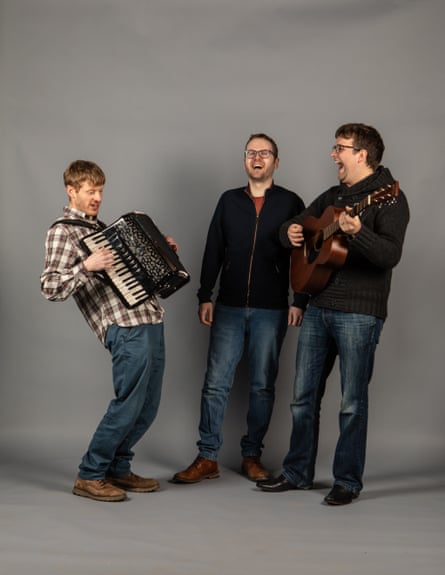
Teesside trio inspired by Ewan McColl and Peggy Seeger whose singalong music celebrates real heroes
“So, when Nick Griffin said people should listen to English folk music…” Suddenly the green room of the Apex in Bury St Edmunds, which I am connected to via Skype, descends into rowdy noise. The three County Durham men creating the chaos are the Young’uns – Sean Cooney, who’s speaking, Michael Hughes and David Eagle – having downtime before the latest leg of their tour tonight. “He just doesn’t get it, does he?” says Cooney, the band’s main songwriter. “Folk music is about pleasure and fellowship. And within that, you can change perceptions, if you do it right.”
In the last few years, the Young’uns have certainly done that. Teenage friends who chanced upon a folk session in their local pub a decade ago, they make deeply rousing, traditional, singalong music – but their subjects will surprise newcomers. On their last conventional album, 2017’s Strangers, Be the Man was inspired by the true story of Matthew Ogston, a man whose fiance, Nazim Mahmood, killed himself because his family couldn’t accept his homosexuality (“my love took his own life because of bigotry”, go the lyrics). Then there was Ghafoor’s Bus, a song about a Teesside garage owner, Ghafoor Hussain, who took a team of volunteers across Europe to feed refugees (the band later met him for a video online).
“I thought about doing Be the Man for a year before I actually did it, to get it right,” says Cooney. The Young’uns’ audience prefer an older, more traditional kind of folk music. “Some nights, I do wonder about how singing it will go down with certain people in the crowd,” he adds. But the band have had audience members thanking them, even sharing stories about their children coming out. “And that’s worth everything. We’ve made a conscious attempt to write songs about things that moved us – so we must be doing something right!”
Another real-life Teessider appeared on Strangers too: Johnny Longstaff, a 17-year-old boy who committed his life to fighting fascism in the 30s (firstly against Britain’s Blackshirts, then in the Spanish civil war, then in the second world war). The Young’uns came across Longstaff after his son, Duncan, had approached them at a gig with a picture of his late father and a timeline of his life, wondering if he could possibly inspire a song. “Him being born in Stockton-on-Tees, just like us, had an effect pretty quickly,” Hughes says. Soon they heard Johnny’s voice too, on recordings he’d made for the Imperial War Museum; the north-eastern cadences, warmth and humour, were as instantly recognisable as their own. The Young’uns’ first song about Johnny was Cable Street, one of the highlights of Strangers. “Then 15 more followed,” Cooney adds, and the band laughs.
Together, they make up the live show and album, The Ballad of Johnny Longstaff, a production that weaves Longstaff’s recordings around original compositions. They were strongly influenced by Ewan MacColl and Peggy Seeger’s pioneering 1950s Radio Ballads series, which took oral testimonies of working-class people as inspiration for broader songs . “We also liked the idea of it not being an album alone,” Cooney says. “Music is so fluid now. You can do anything you want with it. And because we tour so much, it made sense to do something more ambitious around it, and take it out to people in a different way.”
At the shows, a copy of a newspaper about Johnny sits on every seat, and archive images are projected on screen on top of peeling Spanish street posters; an interactive app also lets fans explore Longstaff’s life. Live, the bluntness of Longstaff’s speeches burn through. At one point, he says: “[Soldiers] were expecting to come back as heroes, they didn’t come back as heroes – they were the first people to be victimised.” At another, he vocalises a sentiment rarely broadcast in those pre-Brexit times: “There was a feeling that you’re of the world in every town and every village in Britain.” “Things like that really stuck with us,” Hughes says.
“But,” adds Eagle, “we didn’t want to be sentimental. Nor did we want to be singing protest songs. If we did rant and rave, we’d be preaching to the converted.” More than anything they wanted Johnny to sound as if “he could be around today”, and in this approach is the Young’uns’ inherent power as a band. “After all,” Cooney says, “this didn’t happen very long ago. If we can remind people of that, we start to look again at what we do in our world.” JR
The Young’uns play The Ballad Of Johnny Longstaff at Perth theatre on 23 May, then tour summer festivals
More woke folk: four other acts putting the rebellion back into roots music
Oran Bagraidh
This 10-person collective set themselves to an incredibly political project this year: recovering a lost language, Galloway Gaelic, once spoken for centuries across south-west Scotland. The group includes Scots/Gaelic singer Josie Duncan, Belfast fiddler Conor Caldwell, and the extraordinary medieval Welsh-singing duo Bragod, whose singer, Mary-Anne Roberts, comes from Trinidad. A film of their work can be found on their website and they tour this summer
Hickory Signals
Married couple Laura Ward and Adam Ronchetti, whose debut album, Turn to Fray, combines traditional songs like Bushes and Briars with socially conscious, abstract modern compositions. These include songs about forgotten women such as the reclusive British poet Rosemary Tonks, and F Scott Fitzgerald’s wife, Zelda; a track called Kana, inspired by a refugee Ward worked with on the Greek island Samos in 2015, and the title track, a song about a woman escaping abuse (Ward works with women, families and young people affected by substance abuse for a Brighton charity).
Jimmy Aldridge and Sid Goldsmith
Jimmy Aldridge and Sid Goldsmith’s recent album, Many a Thousand, surveys traditional songs that speak to modern politics. There’s Working Chap, a Scottish ballad about the enforced poverty of the working classes, which society has yet to solve; a version of the spiritual No More Auction Block, which Jimmy and Sid give another verse (in which it is imagined that all wars have been eradicated), and The Last Ploughshare, a Lincolnshire ballad about the mistreatment of the natural world.
Burd Ellen
The solo project of Debbie Armour, a collaborator with Alasdair Roberts and Trembling Bells’ Alex Neilson, whose forthcoming album, Silver Came, explores women’s narratives in folk song. She supports Liela Moss, formerly of the Duke Spirit, in Glasgow next month, and plays folk festivals across the UK this summer. JR
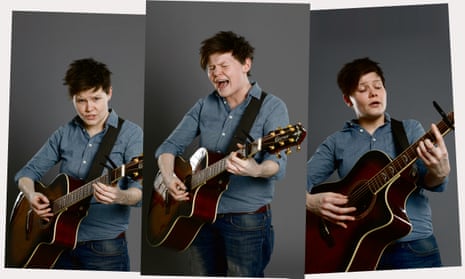


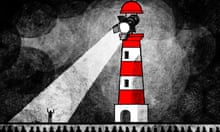
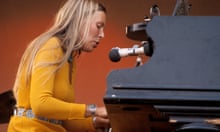
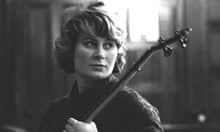

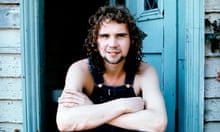

Comments (…)
Sign in or create your Guardian account to join the discussion